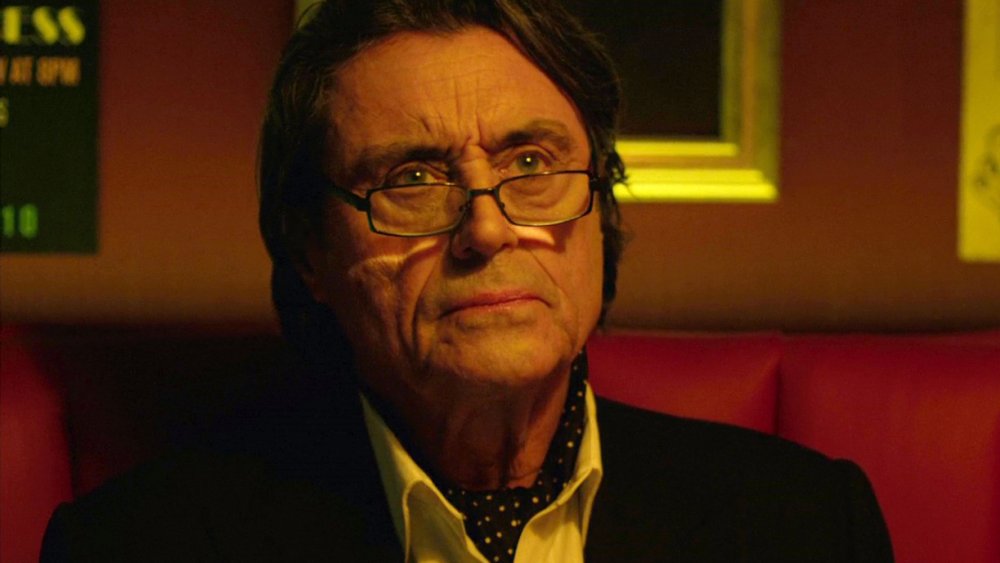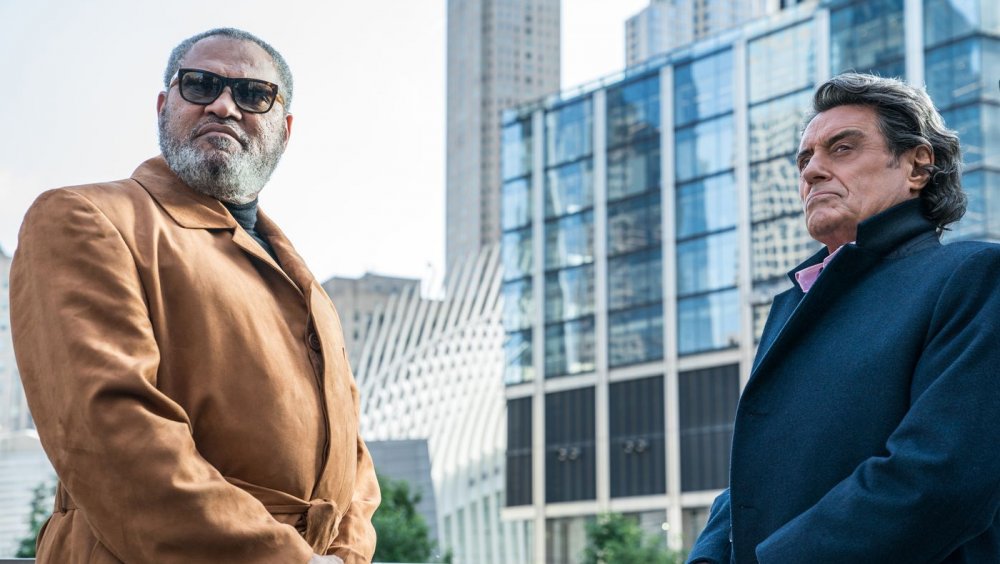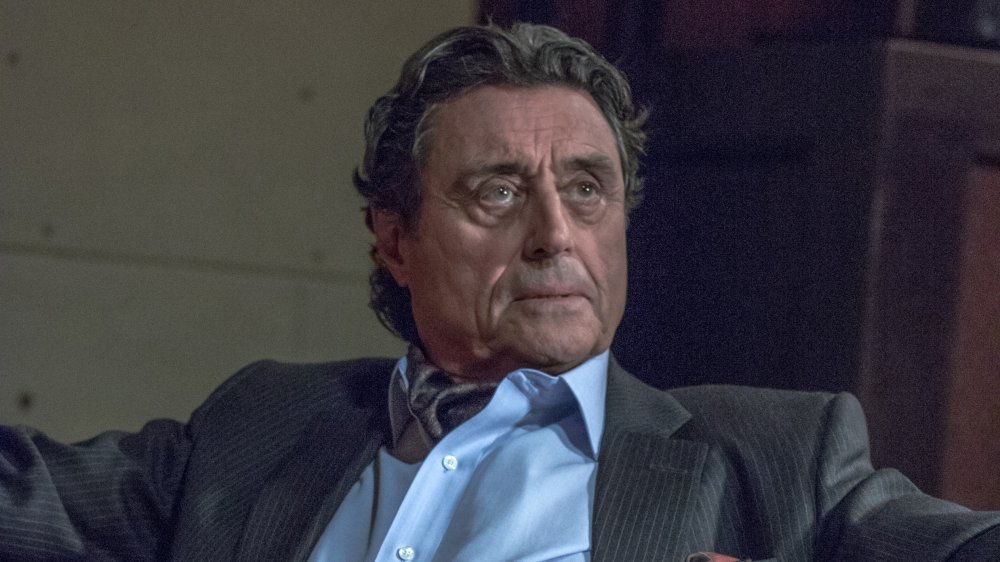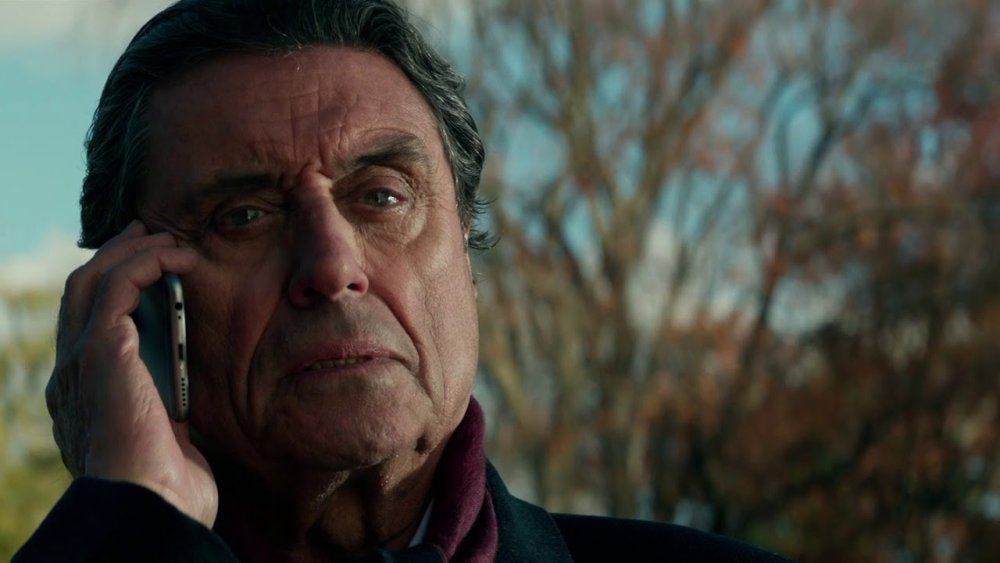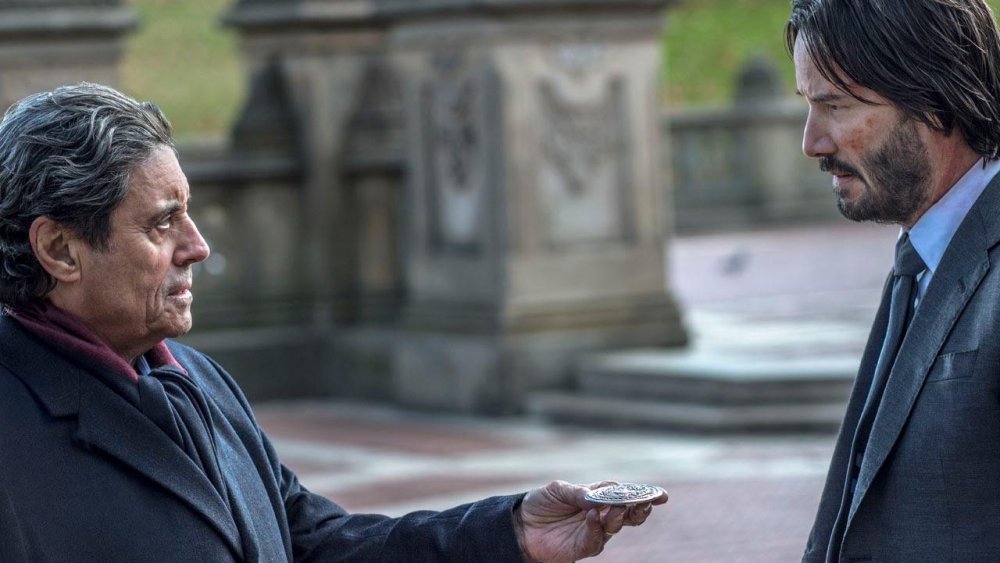Winston's Backstory In John Wick Explained
Aside from its title character, the most important personality in the John Wick action saga is Winston, enigmatic proprietor of the New York branch of the Continental Hotel. These hotels, dotted around the world, serve multiple purposes: Safe neutral harbor for hunters and the hunted, one-stop shop for the violently inclined, and even a cheeky bit of dog-boarding, should the odd need arise. Any manager of a Continental must come from a background that can be described in the simplest terms as "colorful," but Ian McShane, who portrays Winston, isn't immediately interested in coughing up his character's secrets. When asked by Den of Geek if he has crafted any kind of history for Winston, his answer is simple enough: "Yeah, I make up my own and it varies according to how you see it. I'm not going to tell you what it is, but yeah." Director Chad Stahelski is equally evasive in an interview with The Hollywood Reporter: "I like open-ended questions, sometimes, where not everything gets answered. I also like satisfying the audience, but I like leaving a little to your imagination and a little open for debate."
There's more to pick out about Winston than it might seem at first blush in the three current John Wick films, but the answers come from sources not directly connected to him, necessarily. Here's what can be pieced together about Winston's history through his characterization and the world-building around him, and how that might increase in significance as the already-confirmed fourth and fifth entries come together.
Other characters' respect demonstrates Winston's skills
Winston, as of this writing, has not exactly fought in the same way John Wick and the rest of his adversaries have (to be fair, Ian McShane was 77 in John Wick 3), but he has displayed some of his skill. He is shown to be a pretty impeccable marksman, but probably his most obvious skill is his capacity for leadership. He commands attention and loyalty by doing actually quite little, because it is clear that everyone interacting with him understands who he is and where he came from, much in the same way literally everyone in the universe interacts with John Wick. It's not just The Rules giving him clout; Winston is known like John is, but it's displayed with negative space and narrative — it's what people don't do or say around him, up to and including The Adjudicator. He's also an excellent negotiator, able to talk down hotheads on the verge of breaking the Continental's rules (with the only notable exception being John's murder of D'Antonio at the end of John Wick 2) and acting as power broker for the hotel all throughout the third movie.
If The High Table is composed of organized crime elite, so then must the ranks of Continental managers be, as well. Rather than being the dons, shot-callers, and bosses of families, however, it may be reasonable to assume that the hoteliers are the erstwhile right hands of those at the Table. Who better to run a hotel for hired killers than the best of those among them? It is likely the closest any of them will ever have to a retirement — and the idea does in fact have a teeny bit of canonical support through Sofia's characterization.
Winston defines himself by running a Continental location
We know the most about how to ascend to running a Continental through Sofia, Halle Berry's character in John Wick 3. She is a former hunter, and in ascending to take The Continental, it meant giving up a significant part of her life; despite the safety the hotels are meant to provide, apparently Sofia could not (or simply chose not to) take her daughter with her, and John hid the girl for her, which is what created the Marker relationship between them. Sofia is less than ecstatic about fulfilling the Marker and describes her life as Management as the most peace she's ever had, despite the loss of her child. Perhaps Winston was similarly motivated in seeking to run the New York Continental, and later on, fight so hard to retain his lordship over it and remain in respected-slash-feared status with The High Table. He doesn't just take the job seriously, he relishes it, as he levels The Rules against D'Antonio in John Wick 2 when he tries to have Wick's membership revoked. There's a personal flair in how he enjoys thumbing his nose at people of theoretically-higher status than him.
Berrada, the former manager of the Morocco Continental, appears to have been demoted in a way similar to the one with which the Adjudicator threatens Winston in the third film. Since we later see that if The Adjudicator wishes to kill, they will, "getting affairs in order" must mean living anywhere but the hotel. Winston, however, has "served" for 40 years, though it's unclear if that's all time running The Continental or not. If it is, he would have ascended to the job in his 30s, which would likely be a prestigious thing for someone so young, and such a long time in such a cushy job certainly would make anybody a little possessive of it.
The phone call Winston made in John Wick 2 spoke volumes
John Wick 2 ends with John meeting Winston at the Bethesda Fountain, where Winston tells him that the reckoning he will suffer in the next film is at hand. We see Winston make a phone call to make John excommunicado, and he must give an identification number to certify the order: 11111. That feels like an awfully low identification number, meant to evoke the idea that Winston has been around a long time — longer than probably several members of The High Table and definitely longer than whoever The Elder is, since he appears to be younger than even John Wick. Time means history, and history begets secrets, so Winston must have a lot of them.
We can't be really sure how long this underworld system has operated. The only clue we have to the organization's age is the displayed gold coin in Berrada's compound. He doesn't say how old it is, only that it was extraordinarily difficult to track down. Considering the sheer amount of people registered in the system of this universe, however, only five digits in an ID number — and all ones, at that — means he could be somewhere close to the foundational infrastructure of the underworld as we understand it in the movies. Winston can pretty much have a claim to a catchphrase when he says that the rules are what separate us from the animals multiple times across all three films. Is that the voice of experience? Does he remember a time before The Rules? He also tells The Adjudicator that his loyalties "extend far beyond" The Continental, possibly beyond the jurisdiction of The Table itself. He has clearly lived many lives in his long years, and we have yet to know all of them, or even the totality of one he's living now.
Winston's relationship with John, and what John Wick 4 & 5 may bring
The biggest question for Winston's background is where the friendly relationship with John begins, and now possibly ends. It's frequently stated and even occasionally leveraged against Winston that he is pretty fond of John, but understanding why is a game of speculative leaps of logic. They don't appear to have much in common, since John's rather a hothead and Winston is savage in his calm, icy attitudes towards others. Winston gave John a Marker at the end of John Wick 2 – a Marker that has yet to be identified or cashed in — as well as the hour head start to get away. Winston appears to owe John a favor, and the stakes have not gotten high enough yet for John to feel like cashing it in.
Winston knows John well enough to hold his sense of internal honor and emotional state against him, as he does when asking as which "version" of John he wants to die before confronting The Adjudicator. We don't know if the result, which puts John over a balcony to fall four stories, is a double/triple/quadruple-cross, but it nonetheless proves a level of intimacy. In any other context, you wouldn't hesitate to call them friends, and friends are only made through time spent together doing stuff. Winston displayed total willingness to break rules for John up until he was forced to declare him excommunicado. In this universe, that comes from trust earned off the back of taking risks for each other. The tale waiting to be told between them will likely be part of the plot for both the fourth and fifth movies in the franchise. Is it a display of the ultimate trust to undermine The Table, or an ultimate betrayal to leave John to the wolves?
